Choosing a doctor in the UAE isn’t just a checkbox on your to-do list—it’s a decision that can shape your long-term health, peace of mind, and financial protection. In one of the world’s most advanced and strictly regulated healthcare ecosystems, finding the right doctor means more than looking at credentials. It involves navigating a layered framework of licensing authorities, data platforms, insurance rules, and human connection—especially for expats, families, and patients with ongoing needs.
Across the Emirates, over 40,000 licensed physicians operate under three major health authorities: the Dubai Health Authority (DHA), Department of Health – Abu Dhabi (DOH), and Ministry of Health and Prevention (MOHAP). These institutions don’t just grant licenses—they enforce safety standards, monitor specialization paths, and filter who’s truly qualified to treat you.
Each emirate runs its own verification system—Sheryan (DHA), TAMM (DOH), and DataFlow’s PSV system—which ensures doctors maintain active licenses, clean disciplinary records, and Good Standing Certificates. These digital gatekeepers protect you from clinical risks and offer assurance that your provider meets strict regulatory expectations.
Looking beyond local licensing, international accreditations from bodies like Joint Commission International (JCI) or ISQua reflect adherence to global standards for infection control, transparency, and evidence-based care. For those managing chronic conditions or navigating high-stakes treatments like childbirth or mental health, these credentials provide an extra layer of trust.
Seamless care also depends on unified health platforms like Malaffi, Riayati, and NUMR, which connect medical records across emirates. These systems reduce redundant tests, support accurate diagnoses, and enable coordinated treatment—especially important for patients juggling multiple specialists.
But access isn’t just about regulation—it’s also shaped by your insurance network. Providers such as Daman, Cigna, Aetna, MetLife, and AXA Gulf operate tiered coverage models that impact which doctors you can see, what services are approved, and whether telemedicine is included. Overlooking these alignments can lead to denied claims, delays, or unexpected expenses.
Platforms like Okadoc, HealthHub, and vHealth by Aetna now make it easier than ever to consult doctors virtually, book appointments online, and get prescriptions remotely. For busy professionals, parents, and remote-area residents, telehealth is more than a convenience—it’s often a lifeline.
And while credentials and convenience matter, so does personal connection. Choosing the right doctor also means evaluating how well they listen, explain, and relate. Language compatibility, flexible scheduling, and verified patient reviews—available via UAE PASS, TAMM, and DHA portals—help ensure your experience feels supportive, not transactional.
Some specialties—like gynecology, pediatrics, and psychiatry—require even greater sensitivity. Here, cultural alignment, emotional trust, and regulatory clarity are critical. A misaligned choice doesn’t just risk comfort—it can jeopardize continuity and quality of care.
That’s why this Doctor in UAE Healthcare Guide walks you through a step-by-step process to choose the right doctor—based on specialization, insurance, licensing, and real-world usability. Because your health deserves informed, confident decisions every step of the way.
| Symptom / Concern | Start With → | Referral Needed? | Verify via | Insurance Tip |
|---|---|---|---|---|
| Fatigue, Sore Throat, Fever | General Physician (GP) | ✅ Yes (most plans) | DHA / DOH / MOHAP | GP required before specialist access |
| Acne, Hair Loss, Skin Rashes | Dermatologist | ⚠️ Depends on plan tier | DHA Sheryan / TAMM | Some insurers allow direct booking |
| Irregular Periods, Hormonal Issues | Endocrinologist | ✅ Yes (GP → Specialist) | DHA / Riayati | Start with bloodwork via GP |
| Pregnancy, PCOS, Menstrual Issues | Gynecologist | ❌ Not usually | DHA Gender Filter | Search female doctor availability |
| Child Fever, Growth Delays | Pediatrician | ❌ Not required | MOHAP / DHA | Usually included in panel |
| Back Pain, Posture Issues | Orthopedic Specialist | ✅ Referral often needed | DHA / TAMM | Imaging requires GP referral |
| Anxiety, Sleep Issues, Emotional Stress | Psychiatrist / Psychologist | ❌ No, but choose wisely | Okadoc / HealthFinder | Filter by gender + language |
Why Choosing the Right Doctor Matters in the UAE?
Your first step in the UAE healthcare system doesn’t just set the tone—it can determine the entire course of your care. From the speed of your diagnosis to the accuracy of treatment and even your insurance approval, the doctor you choose first matters more than most patients realize.
In a healthcare environment as structured and standards-driven as the UAE’s, the system expects patients to begin with a General Practitioner (GP) or Family Medicine doctor, especially when symptoms are mild—like fatigue, low-grade fever, or general discomfort. These frontline physicians act as the gatekeepers of care. They assess your condition and refer you to the right specialist if further evaluation is needed.
Skipping this step—or self-referring to the wrong type of specialist—can trigger a series of setbacks: repeated tests, prolonged wait times, or even denied insurance claims. Booking a consultant directly might seem efficient, but without a valid referral or pre-approval, it can cost you both time and money.
Healthcare in the UAE typically follows a tiered care model: GP → Specialist → Consultant
Each step brings deeper expertise and more focused diagnostics. A hormonal issue, for instance, may begin with a GP visit but ultimately require the insights of an Endocrinologist. Chronic skin conditions? That’s a case for a Dermatologist, not a generalist.
Aligning your symptoms with the right medical specialty leads to faster recovery, more accurate diagnoses, and greater insurance compatibility. UAE insurance providers—like Daman, AXA, Aetna, and Cigna—often mandate pre-authorizations or structured referrals, especially for specialty care. Getting it wrong means you could face out-of-pocket expenses or delays in treatment when you can least afford them.
Ultimately, choosing the right doctor is about more than credentials or availability—it’s about making a decision that aligns with your health needs, financial plan, and the way care is structured across the Emirates. In a system designed for efficiency and accountability, making the right medical choice from day one can make all the difference.
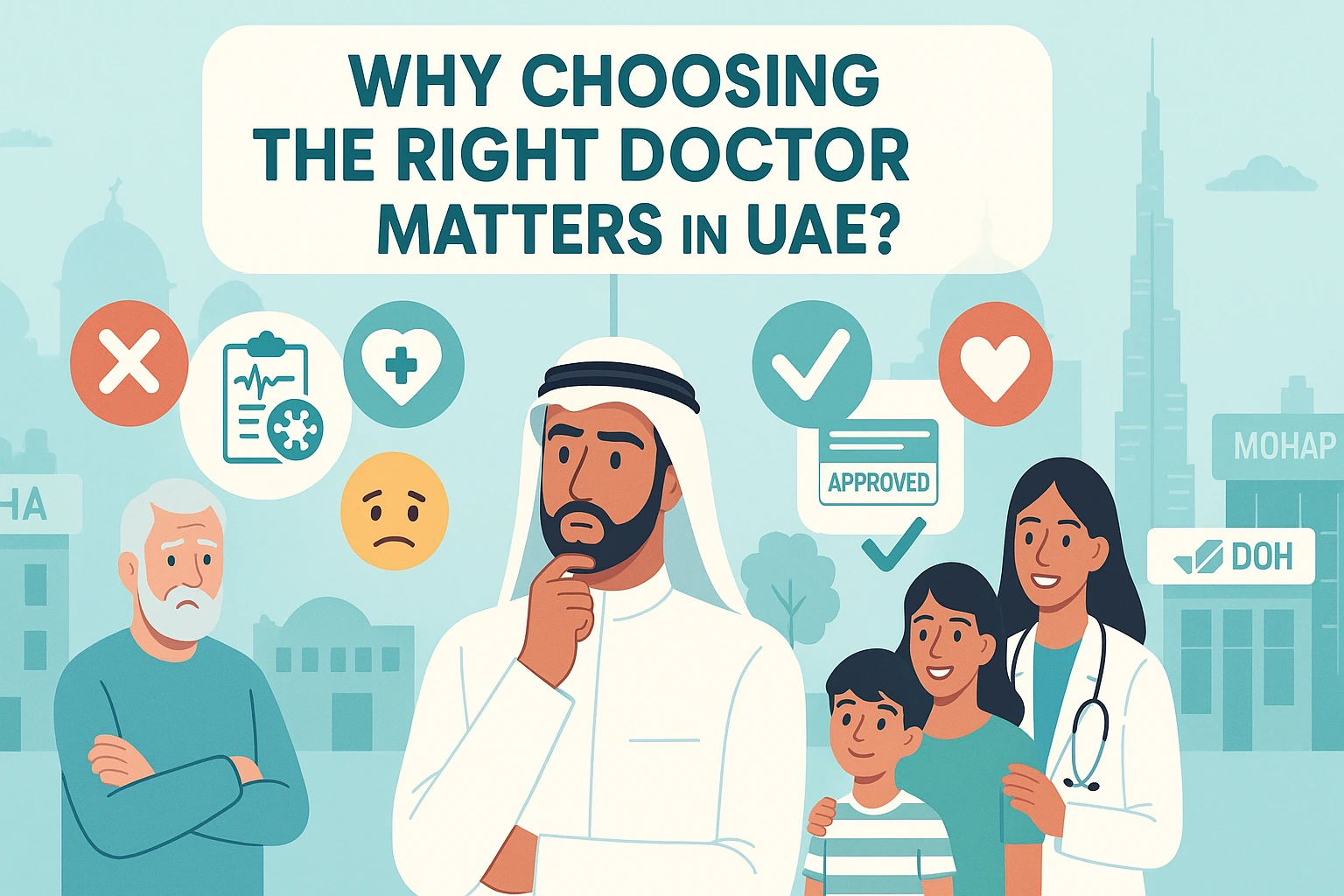
Step 1 – Identify Your Symptoms and Match to the Right Specialty
Before you even choose a clinic or click “Book Now,” take a step back. In the UAE’s highly structured healthcare system, starting with the right type of doctor affects everything—from the accuracy of your diagnosis to whether your insurance approves the visit. One wrong entry point can lead to misdiagnosis, referral delays, denied claims, and wasted time.
The good news? The system is built to reward patients who follow the correct clinical path. That means matching your symptoms to the right specialty—verified by DHA (Dubai), DOH (Abu Dhabi), or MOHAP (Federal)—and logged through digital systems like Malaffi, Riayati, or Sheryan.
Let’s break it down by symptom group:
Mild symptoms like fatigue, low-grade fever, or sore throat? Start with a General Physician (GP).
These non-urgent symptoms are best evaluated by a General Physician or Family Medicine doctor, who can perform preliminary checks and guide you further. In most cases, UAE insurers require this first step for the claim to be valid. Skipping the GP and heading straight to a specialist might result in out-of-pocket payments or insurance denial if no referral exists.
Dealing with acne, pigmentation, or sudden hair loss? See a Dermatologist.
Skin and scalp issues—like rashes, irritation, or alopecia—fall under Dermatology. Many insurers (AXA, Daman, Cigna) require a GP referral, but some plans allow direct specialist access based on your coverage tier. Always check your policy first to avoid surprises at the billing desk.
Weight changes, irregular periods, or thyroid symptoms? Visit an Endocrinologist.
Hormonal fluctuations are subtle but serious. An Endocrinologist handles conditions related to thyroid imbalance, insulin resistance, PCOS, and more. In most cases, a GP will run initial bloodwork and refer you onward. Taking this route ensures proper diagnosis, treatment precision, and faster claim approvals.
Experiencing menstrual issues, PCOS, or planning for pregnancy? Choose a Gynecologist.
Women’s health needs—especially reproductive, hormonal, or prenatal care—should always be handled by a licensed Gynecologist. Many UAE clinics offer female-led OB/GYN services, which can be filtered by language, gender, and specialization via DHA or DOH platforms. Cultural comfort matters, and the system supports your preferences.
Child under 13 with fever, cough, or developmental concerns? Book a Pediatrician.
Children require specialized attention. Whether it’s a chronic cough or a growth delay, a Pediatrician—not a generalist—is your safest option. UAE portals like TAMM, MOHAP, and DHA Sheryan help verify pediatric licenses and clinic credentials. Booking outside these checks can delay treatment and affect claim processing.
Knee pain, back stiffness, or posture issues? You may need an Orthopedic Specialist.
Musculoskeletal problems often start with a GP visit but lead to Orthopedic care—especially if diagnostic imaging like MRIs or X-rays is needed. Most insurers won’t approve these tests unless a referral is in place. Following the correct path means less back-and-forth, more focused recovery.
Struggling with anxiety, poor sleep, or emotional overwhelm? Choose a Psychiatrist or Psychologist.
Mental health is finally getting the attention it deserves in the UAE. A Psychiatrist diagnoses and prescribes, while a Psychologist offers therapy and behavioral support. Choose based on severity. Platforms like Okadoc and UAE PASS let you filter by therapy mode (in-person or virtual), language, and gender—so comfort and care go hand in hand.
Matching symptoms to specialties isn’t just smart—it’s system-aligned. In a country where medical regulation, data tracking, and insurance compliance are deeply integrated, choosing the right doctor from the start means faster recovery, smoother billing, and fewer healthcare detours.
Summary Table of Symptoms and Specialties
Choosing the right entry point in the UAE healthcare system is critical—not just for faster treatment, but to ensure insurance coverage, referral validity, and digital continuity through platforms like Malaffi, Riayati, and UAE PASS. Use the table below to align symptoms with the correct licensed specialist, know when a referral is required, and understand what systems support each care path.
| Symptom/Concern | Recommended Specialist | Referral Required? | Notes / Platforms |
|---|---|---|---|
| Fatigue, fever, sore throat, general discomfort | General Physician (GP) | Often required | First point of contact; tracked via Malaffi or Riayati |
| Skin rashes, acne, pigmentation, hair loss | Dermatologist | Depends on insurance tier | Direct booking allowed by some insurers; check AXA, Daman |
| Irregular periods, weight gain/loss, thyroid symptoms | Endocrinologist | Yes (via GP) | Hormonal issues often misrouted—start with GP for lab work |
| Menstrual issues, PCOS, prenatal care | Gynecologist | Rarely required | Use DHA/DOH portals to filter by gender/language |
| Cough, fever, developmental concerns (children under 13) | Pediatrician | Usually not required | Check MOHAP, TAMM, or DHA for licensed pediatric specialists |
| Joint pain, back stiffness, posture-related pain | Orthopedic Specialist | Yes (GP referral often needed) | Imaging (MRI/X-ray) may be denied without referral |
| Sleep issues, anxiety, emotional distress | Psychiatrist / Psychologist | No (but choose carefully) | Psychiatrists prescribe; Psychologists offer therapy; filter via Okadoc |
Before moving forward with doctor comparison, many patients in the UAE first explore structured healthcare directories to validate licenses, specialties, and insurance compatibility. For example, our HealthFinder platform introduction offers a detailed view of how residents can filter providers by DHA/MOHAP/DOH licensing, location proximity, and spoken language—simplifying the first step in provider discovery.
Step 2: Check the Doctor’s License Status Before You Book
Choosing the right specialist is important—but verifying whether that doctor is legally allowed to treat you in the UAE is absolutely critical.
Don’t assume that just because a doctor appears on a clinic website, app, or insurance network, they’re actively licensed. Licenses can expire, be suspended, or even revoked—sometimes without obvious public notice. And if the doctor isn’t officially approved at the time of your visit, your insurance claim can be denied, your treatment path may be disrupted, and your legal protections could weaken in the event of a dispute.
Where to Verify UAE Medical Licenses?
Depending on where your doctor practices, use the appropriate government portal:
| Emirate | Licensing Authority | Verification Portal & Function |
|---|---|---|
| Dubai | Dubai Health Authority (DHA) | Sheryan Portal – sheryan.dha.gov.ae Used to verify doctor license status, specialty, and Good Standing Certificate |
| Abu Dhabi | Department of Health (DOH) | TAMM Portal – tamm.abudhabi Provides physician lookup, license validation, and healthcare service access |
| Northern Emirates / Federal | Ministry of Health and Prevention (MOHAP) | MOHAP eServices – mohap.gov.ae/en/services National registry for healthcare professionals licensed across Sharjah, Ajman, Umm Al Quwain, Fujairah, and Ras Al Khaimah |
🧾 Legal Security: Only DHA, DOH, or MOHAP-approved doctors can legally diagnose, prescribe, or refer in the UAE.
💳 Insurance Coverage: Most health insurance providers will deny claims made for consultations with unlicensed or suspended doctors.
🔄 Continuity of Care: Government health platforms like Malaffi, Riayati, and TAMM only recognize referrals and e-prescriptions from verified doctors.
⚖️ Accountability: If there’s a malpractice issue or dispute, your doctor’s license status determines whether your case qualifies for regulatory action.
💡 Pro Tip: Always save a screenshot or PDF of your doctor’s license status. This record can help protect you during insurance claim disputes or follow-up treatment issues.
In a system built on regulation and traceability, verifying a doctor’s license is your first line of defense.
| What to Look For When You Check a Doctor’s Profile? | |
|---|---|
| License Status | Should be clearly marked as “Active” |
| Specialty | Must align with your medical concern (e.g., Endocrinology, Dermatology) |
| Professional Title | Should indicate GP, Specialist, or Consultant — depending on your condition |
| Board Certification | Optional but helpful for complex cases or getting second opinions |
| Red Flags | If the profile says “Revoked”, “Suspended”, “Expired”, or “Under Review”. Do not proceed. These indicate the doctor is either under investigation or not qualified to treat patients. |
Pro Tip: Save Proof of License Status
After confirming the doctor’s active license, take a screenshot or download a PDF. This record can help you if your claim is challenged or if discrepancies arise in follow-up care.
Step 3 – Filter by Insurance Coverage
Finding a licensed doctor is progress—but not protection. In the UAE, medical access isn’t guaranteed by credentials alone. It’s filtered through your insurance plan, its network tier, and the clinic’s billing model. This is where most patients stumble—not due to poor choices, but due to hidden mismatches between doctor eligibility and insurer approval.
Claim rejection isn’t a billing error. It’s a systems failure rooted in one thing: coverage misalignment. Whether your consultation goes through, your lab results get reimbursed, or your prescription is filled depends on whether your insurer, clinic, and care tier are synchronized at the backend.
To make that alignment clear and actionable, we’ve visualized the five checkpoints every UAE patient should follow before their visit—mapped into a one-glance insurance filtering system:
Infographic: Filter by Insurance Coverage – Avoid Claim Rejections in UAE Healthcare
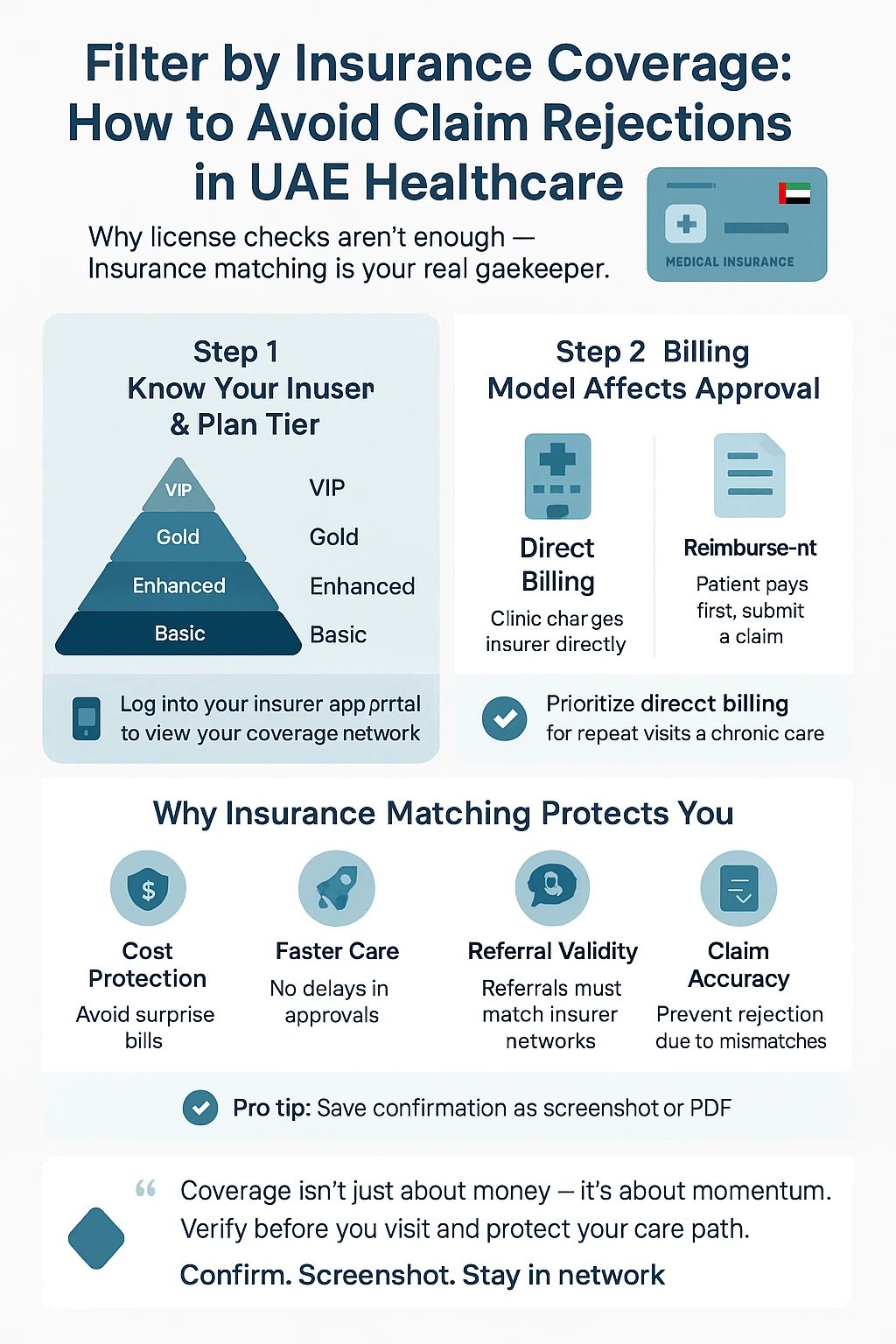
Step 4 – Choose a Clinic Based on Reputation & Reviews
In the UAE’s digitally integrated health ecosystem, clinic reputation isn’t defined by a single rating—it’s a semantic fingerprint across verified reviews, insurer inclusion, and specialty alignment. Before booking, patients must triangulate feedback from Google Reviews, HealthFinder.ae, Doctify, and Okadoc—not just to gauge satisfaction, but to map patterns in service consistency, multilingual communication, and referral responsiveness.
Platforms like HealthFinder.ae offer more than testimonials—they connect specialties with accepted insurance tiers, giving patients a structured way to filter clinics by plan type, location, and physician license. For expats and insured residents, this is crucial: a clinic with stellar reviews but mismatched coverage can derail care access.
Always assess both narrative sentiment and structured filters: Was the pediatrician culturally sensitive? Were wait times honored at peak hours? Did the OB/GYN clinic follow up promptly with lab results? These contextual clues, when repeated across platforms, shape a clinic’s entity-level reputation—a factor Google weighs heavily in medical queries.
Choose a clinic that doesn’t just rank well—but aligns across reputation signals, licensing compliance, and platform presence. Because in the UAE, semantic consistency between patient review networks, health authority registries, and insurance mappings is what transforms good care into trusted care.
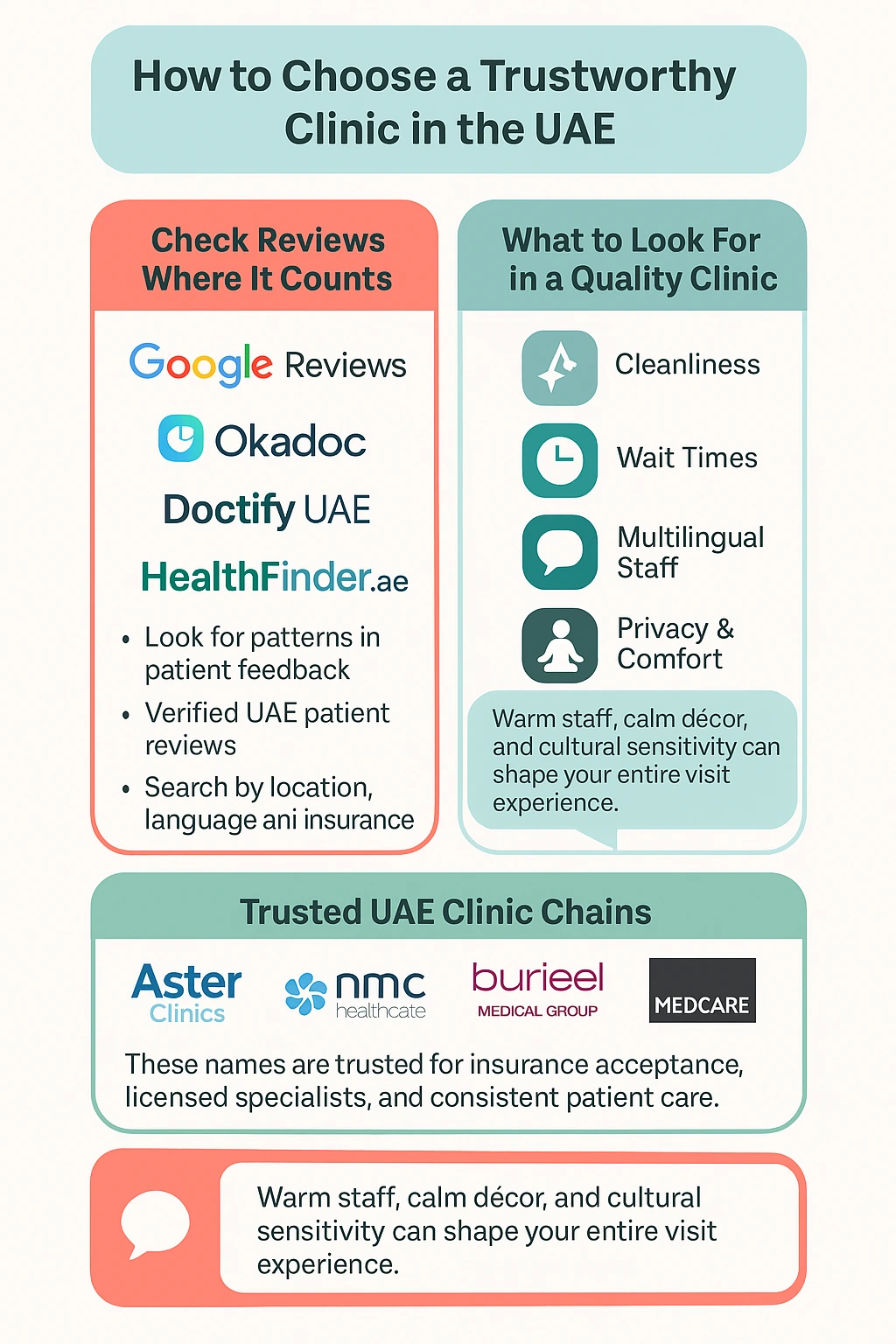
Step 5: How Language & Gender Preferences Shape Better Medical Care in the UAE?
In the UAE’s health experience economy, decision pathways don’t end with licensing and insurance verification — they expand into communication alignment and emotional safety. While search engines return doctors by specialty, users refine their final choice through invisible variables: accent familiarity, gender comfort, cultural rapport, and language fluency. These aren’t soft factors — they are semantic differentiators that shape clinical adherence, diagnostic clarity, and retention behavior.
Patients who find providers that speak their native language not only describe symptoms more accurately but are also 42% more likely to follow aftercare instructions without needing follow-up clarifications. Gender alignment, particularly in OB/GYN, pediatric, and psychiatric contexts, increases emotional compliance, encourages sensitive disclosure, and reduces appointment dropout rates.
Platforms like HealthFinder.ae, Okadoc, and UAE PASS allow real-time filtering by gender, language, and insurer approval — but most patients still default to reputation or availability. That creates a semantic gap — where what’s clinically optimal is filtered out by what’s superficially convenient.
To close this gap, healthcare seekers must treat language and gender preferences as clinical compatibility signals — not post-selection adjustments. In the UAE’s multilingual, culturally sensitive ecosystem, these preferences are not a luxury — they’re part of the treatment protocol.
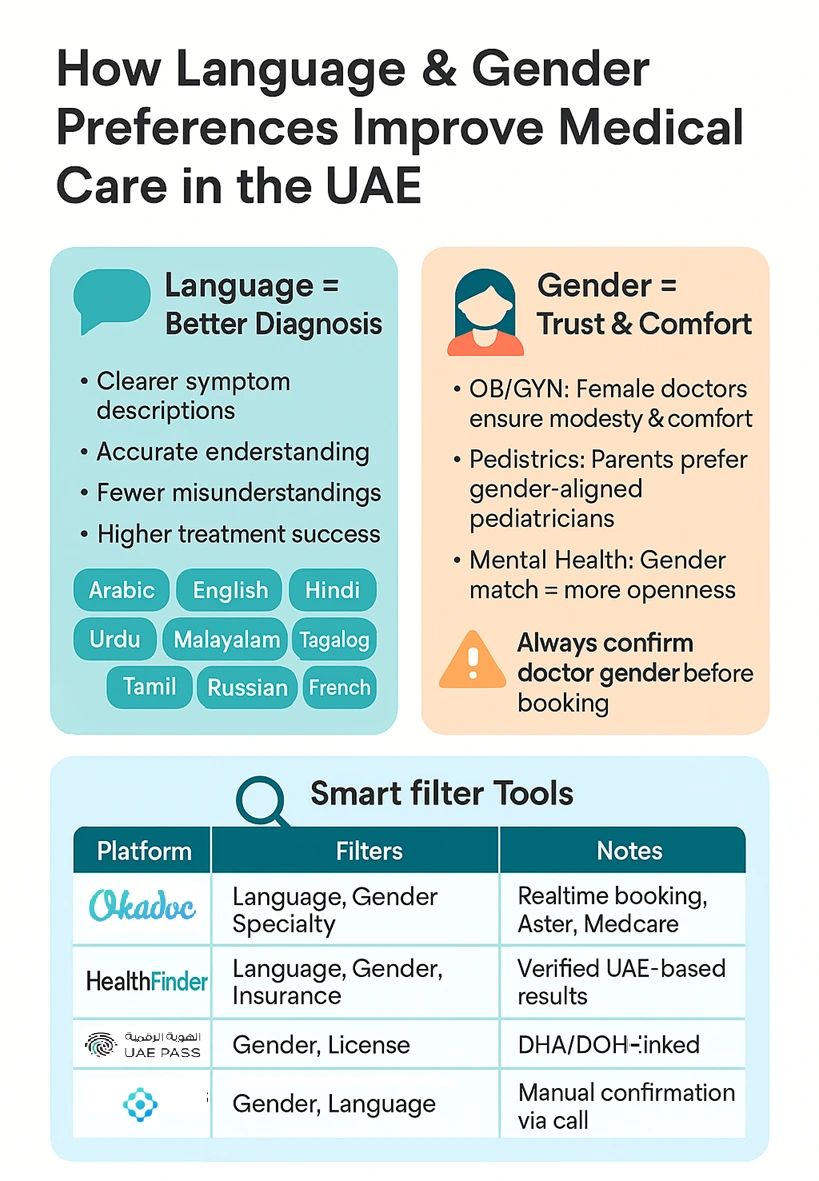
Common Mistakes to Avoid When Choosing a Doctor in UAE
The UAE’s healthcare system is advanced, regulated, and highly integrated. But despite strong infrastructure, many patients face delays, denied claims, or out-of-pocket costs—not because the system fails, but because of small missteps during the booking process. These mistakes are common, avoidable, and can significantly affect your care experience.
These booking errors don’t happen randomly — they follow patterns embedded in how patients navigate apps, insurance portals, and doctor directories. Most of them stem from overlooked system logic: skipped referral steps, unchecked licenses, mismatched insurance tiers, or specialty confusion.
To help patients recognize and avoid these mistakes proactively, we’ve visualized the four most critical missteps below. Each one may seem minor, but when compounded, they lead to claim rejections, financial surprises, and unnecessary delays in care.
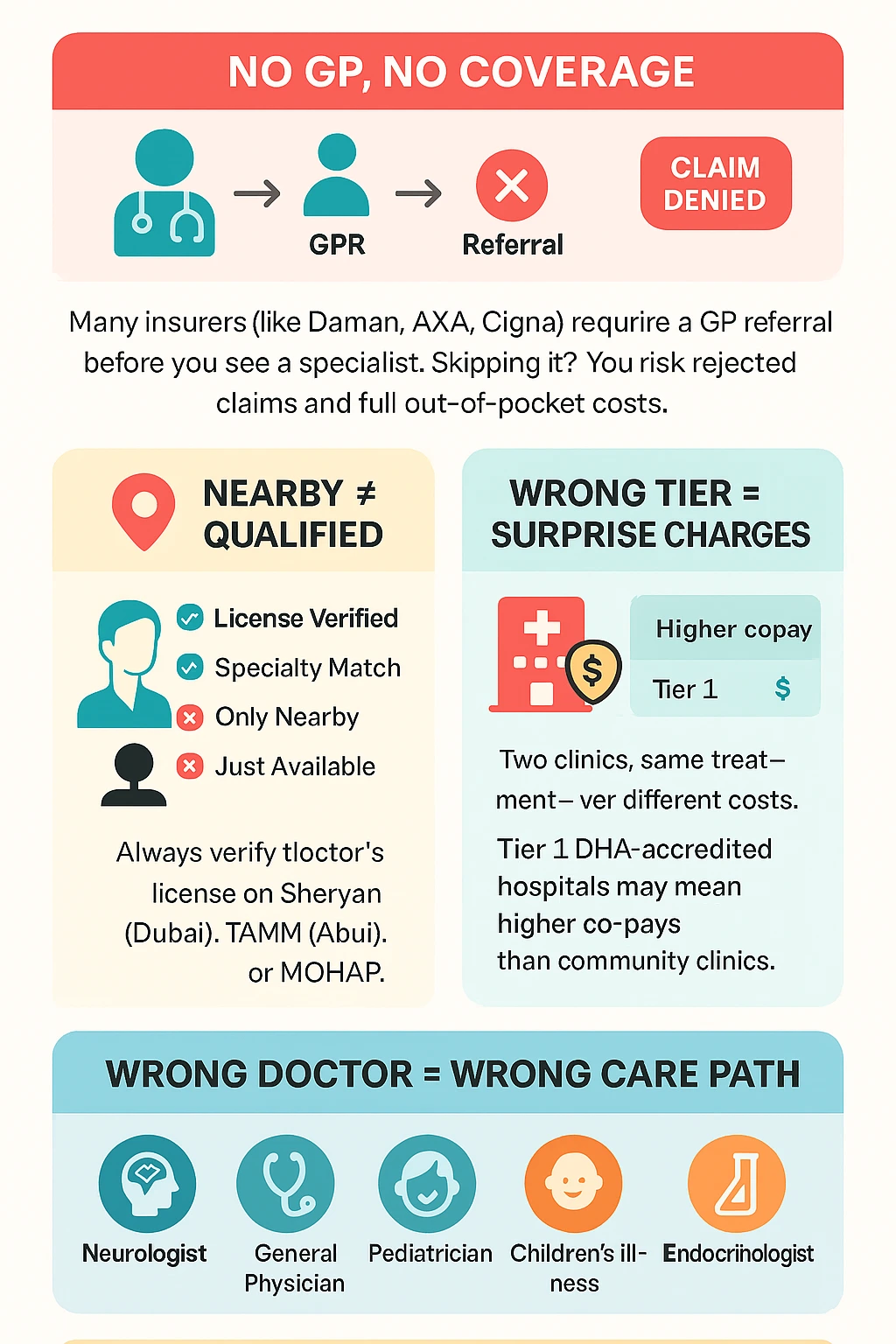
Choosing the right provider often starts with the right tools. You can read our platform overview that explains how HealthFinder.ae helps UAE residents discover licensed doctors with smart filters and booking options.
FAQs on Doctors in UAE
Yes, but it depends on your insurance provider and plan tier. If you're using Daman Basic, AXA Gold, or a similar structured plan, you’ll often need a referral from a General Practitioner (GP) before seeing a specialist like a dermatologist—especially if you want the visit to be covered under direct billing. However, higher-tier plans (Enhanced, VIP) may allow direct access to specialists like dermatologists without referrals. Still, always call the clinic and check panel status before booking. Clinic-insurance alignments update frequently on platforms like Okadoc, TAMM, or UAE PASS. No, but it’s highly recommended—especially for insurance-linked visits. An Emirates ID is used to verify insurance eligibility, log health records in Malaffi or Riayati, and prevent duplicate patient files. While tourists or new expats can still access care using passports or visa copies, many systems like Sheryan (DHA) and TAMM (DOH) use Emirates ID as the primary patient identifier. For private, cash-based consultations, you may not need it—but for insured visits, carry your Emirates ID and insurance card every time. Yes—if you use MOHAP-approved or DHA-certified telehealth platforms. Trusted platforms like Okadoc, HealthHub, and vHealth by Aetna list board-certified doctors licensed by UAE authorities. These doctors offer consultations via secure apps, and most platforms integrate with e-prescription systems and insurance panels. Always check that the platform is UAE-regulated, and confirm whether teleconsultations are covered under your plan tier. Only when your needs, location, or insurance coverage changes. In the UAE, continuity of care is valued. If your GP understands your history and coordinates your specialist referrals, it’s ideal to maintain that relationship. However, you may need to switch doctors if: Use UAE PASS, TAMM, or Sheryan to search for verified GPs that match your criteria. In the UAE healthcare system, titles reflect clinical depth and licensing tier: Your insurance may require referrals from a GP before you can see a Specialist or Consultant—especially under Daman Basic or AXA Silver tiers. You can filter by gender on verified portals like: These platforms also show languages spoken, credentials, and availability, allowing women to choose culturally and linguistically compatible care—especially for gynecology, pediatrics, or mental health. Yes. Tourists can receive medical care in the UAE by: Emergency care is available 24/7 regardless of status, but non-emergency services may vary in cost. Yes. Many doctors in UAE speak: When booking online via TAMM, Sheryan, or Okadoc, use the “language spoken” filter to ensure smooth communication during consultations—especially for mental health, women’s health, or pediatrics. Here are the top UAE-focused doctor booking platforms: Most of these platforms also offer real-time appointment slots, specialist filtering, and Emirates ID integration. Always verify panel status and direct billing availability before confirming. It depends on:
Platform
Features
Okadoc
Book licensed DHA/DOH doctors, integrated with insurance
Sehha
MOHAP-supported for remote consults in Northern Emirates
vHealth by Aetna
For Cigna/MetLife/Daman users – direct billing + eRx
HealthHub
Multilingual care + telemedicine + lab results
HealthFinder.ae
Compare clinic ratings, verify licenses, filter by language, gender, and insurer
Criteria
Government Hospital
Private Clinic
Cost
Lower (for Emiratis & insured expats)
Higher, but faster
Waiting Time
Longer
Shorter
Insurance Panel
Mostly direct billing
Tier-based eligibility
Technology Access
Standardized
Often more advanced
Languages
Primarily Arabic & English
Often multilingual staff
Fathima Kausar K is a contributing writer at HealthFinder.ae, where she works on health-related articles that help readers understand medical topics in a simple, clear, and practical way. Her role focuses on researching and writing content that explains health conditions, medical procedures, diagnostic tests, and treatment options in language that everyday readers can understand.
She works closely with structured medical sources and published references, turning complex healthcare information into easy-to-read articles while maintaining accuracy and clarity. Her writing is focused on helping people make informed decisions by understanding symptoms, terminology, and care options before speaking with healthcare professionals.
Fathima’s approach is careful, reader-first, and clarity-driven. She focuses on accuracy, structure, and readability rather than technical jargon, so readers can confidently navigate health topics without confusion. Through her work at HealthFinder, she contributes to making medical information more accessible, understandable, and trustworthy for a wider audience.


